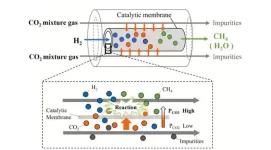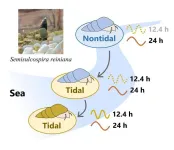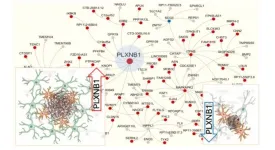Why do people in Paris like seaweed and tofu salad? Will Italians be tempted to try a beetle skewer? How many young Polish consumers are "food innovators", eager to eat chickpea pâté? In an international project, researchers from SWPS University analysed European consumers' attitudes towards alternative protein food products.
In the face of the fight against climate change, more and more people are modifying their diets, giving up or limiting conventional sources of protein (e.g., beef, pork, poultry, and animal dairy) in favour of those with a lower environmental impact. These are the so-called alternative protein food (APF) products, which may be based on legumes, algae, mushrooms, crustaceans and insects.
Although Europe is the leading market in production and sales of APF and original research on this topic is growing, there has been no synthesis of between-country differences in APF choices across Europe, says Hanna Zaleśkiewicz from the CARE-BEH Center for Applied Research on Health Behavior and Health, SWPS University.
Researchers from SWPS University together with experts from Germany, Denmark, Greece, Norway and Italy analysed research from 11 databases of peer-reviewed journals. In total, their analysis included 25 studies conducted in 18 European countries. The results were published in Food Quality and Preference. The researchers focused particularly on data from Denmark, Finland, Poland, the Czech Republic, Italy, Spain, the UK and Germany.
Healthy and ethical in theory, but what about practice?
Research shows that many consumers rate hybrid products, i.e. those combining conventional and alternative protein, higher than meat products in terms of the attributes of being healthy, ethical, environmentally friendly, and nutritious. This trend is observed especially among Danish consumers, but also among consumers from other countries, e.g. the UK and Spain.
Positive attitudes and beliefs, however, do not always translate to intention to buy such products. 60% studies addressing APF-related purchase intentions indicate that Danish consumers have relatively low intention to buy APF products. In one study, only 46% of them were willing to buy hybrid meat (a product combining plants and meat), compared to 63% of consumers in Spain and 53% in the UK.1
Few Polish "food innovators"
Studies show that consumers from Poland and the Czech Republic have less knowledge regarding innovative food products and higher reluctance to adopt novel foods compared to Danish and German consumers.
These patterns should be considered in the context of persistently high intake of meat (compared to pulses) per capita in the years between 2018 and 2020 in countries such as Poland 2, explains Hanna Zaleśkiewicz.
A comparison of German and Polish consumers (aged 55 years or older) indicated that Polish respondents had significantly lower levels of knowledge regarding innovative food products (including those containing APF), were more hesitant in their decisions, and less frequently decided to purchase such products3.
A study4 of young consumers indicated that among people from Germany, “food innovators" (i.e., those who buy soon after various innovative foods are out) and “early followers" (those who buy after some consideration) constitute 73 % of the population.
This contrasts with findings observed for young people from Poland, the Czech Republic, and Slovakia. In those countries, "food innovators" and "early followers" constitute only 24-36 % of young consumers. While strong reluctance to buy innovative APF was not found among young consumers from Germany, it was present among 13-17% of consumers from Poland, the Czech Republic, and Slovakia.
Insect on a plate?
Analysis shows that consumers are reluctant to buy insect-based APF. Only 18-22 % of consumers in the UK and Spain report their willingness to buy such products. Consumers in Sweden and Finland declare more positive beliefs about insect-based food than consumers in Germany and Czech Republic. Consumers in Italy are much less likely to choose such products than consumers in Northern or Western Europe (e.g., Denmark, Belgium).
Food culture and eating patterns in Northern Europe might have changed in recent decades, whereas Italian food culture is considered one of the strongest in Europe, with over 200 food products, where meat plays an important role, the researcher from SWPS University points out.
Seaweed conquers cosmopolitan cities
Specific differences in consumer acceptance of and interest in APF are observed in certain cities.
The rural-urban differences within the country may be explained not by the size of the city but rather by its multicultural and cosmopolitan character, the researcher comments.
For example, cities like Paris and Helsinki, which are more ethnically diverse, tend to exhibit higher levels of consumer acceptance of APF compared to consumers from cities with less ethnically diverse consumers5 6. Consumers from such major cities are also more likely to have restaurants offering alternative cuisine or introducing novel food trends, including alternative protein.
A good example is Paris, where the average consumption of seaweed-based APF is higher than in 5 other French cities. This may be explained with a relatively large population of Asian-origin inhabitants who accept seaweed-based food.
Building consumer motivation
The authors of the analysis emphasise that their findings may help develop strategies aiming to increase APF choices. Taking into account different approaches and levels of knowledge about APF in individual countries will allow to use different promotion strategies.
Considering weak or moderate level of consumption and declared intention to buy APF, it is necessary, for example, to develop and implement promotional campaigns that will increase consumer motivation. The motivational factors could include perceived health benefits, environmental benefits, animal welfare-related motives, comments Hanna Zaleśkiewicz.
The study was conducted as part of the international project “LIKE-A-PRO From niche to mainstream - alternative proteins for everybody and everywhere”, led on behalf of the SWPS University by Professor Aleksandra Łuszczyńska. The project is financed by the European Union under the Horizon Europe Framework Programme.
1. Grasso, S., Asioli, D., & Smith, R. (2022). Consumer co-creation of hybrid meat products: A cross-country European survey. Food Quality and Preference, 100, Article 104586. https://doi.org/10.1016/j.foodqual.2022.104586
2. FAO (2023). FAOSTAT. Retrieved August 27, 2023, from https://www.fao.org/faostat/en/#data
3. Zabrocki, R. (2017). A comparative analysis of the determinants of behaviours of Polish and German consumers aged 55+ in the innovative food market. Handel Wewnętrzny, 1(366), 413–423.
4. Barska, A. (2014). Attitudes of young consumers towards innovations on the food market. Management, 18(1), 419–431. https://doi.org/10.2478/manment-2014- 0031
5. Lucas, S., Gouin, S., & Lesueur, M. (2019). Seaweed consumption and label preferences in France. Marine Resource Economics, 34(2), 143–162. https://doi.org/10.1086/ 704078
6. Nevalainen, E., Niva, M., & Vainio, A. (2023). A transition towards plant-based diets on its way? Consumers’ substitutions of meat in their diets in Finland. Food Quality and Preference, 104, Article 104754. https://doi.org/10.1016/j.foodqual.2022.104754
END





